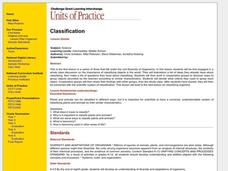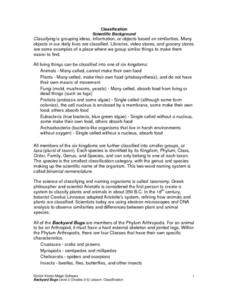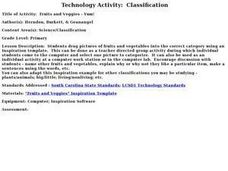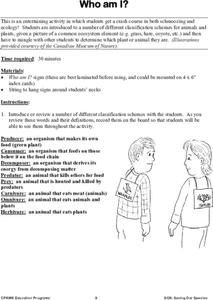Curated OER
Awesome Adaptations!
Second graders explore biology by researching animal characteristics. In this adaptation lesson, 2nd graders identify the history of several animals and research the changes that have occurred to their anatomy over thousands of years....
Rainforest Alliance
Colombia Biodiversity
How diverse is the rainforest? How much more diverse is a rain forest than a temperate forest? Explore these focus questions in a lesson plan that explores the plants, animals, and insects in forests. After listening to a reading about...
Curated OER
Classification
Young scholars investigate how to classify items based on similar characteristics. They study the scientific system of classification.
Curated OER
Animal Diversity
Students examine plants and animals for their similarties and differences. They are read stories and note how the animals in the stories do not have the qualities that real animals have. They complete a worksheet to end the lesson.
Pyro Innovations
Beach Exploration
Little ones will absolutely love this lesson. It's all about the beach and what they can find while sifting through the sand. A large bucket of sand filled with hidden items is brought into the classroom. Learners will discuss what kinds...
Curated OER
School Site Ecosystem
Fourth graders are introduced to the concept of ecosystem; specifically, the interrelationships among plants and animals within an ecosystem, and their relationships to the environment in which they live and interact.
Curated OER
Classification 2: A Touch of Class
Students examine how many kinds of living things (e.g. plants and animals) can be sorted into groups in many ways using various features to decide which things belong to which group and that classification schemes vary with purpose.
Curated OER
Plant Classification
Students share with the class how they think plants are classified and are assessed on their prior knowledge. They use a packet to complete throughout the week at their own pace, which includes various activities to familiarize...
Curated OER
Everything in Its Place: Science Classification
Students investigate the system of classification for living things through the sixteen lessons of this unit. The five kingdoms of monerans, protists, fungi, plants, and animals form the basis of several experiments as the similarities...
Curated OER
Backyard Bugs
Explore the concept of scientific classification and the similarities and differences between plant and animal species. Your class will participate in hands-on activities by investigating dichotomous keys and classifying their shoes. To...
Curated OER
Local Animal Sort
Students examine the concepts of sorting and classifying animal. They use familiar animals to determine the connections between physical characteristics and categorization.
Curated OER
Ocean Life Zones
For this ocean worksheet, learners answer questions about ocean life, the plants and animals of the ocean and their classification, the major life zones of the ocean and questions about an animal of their choice that lives in the ocean.
Curated OER
Fruits and Veggies - Yum!
Students use Inspiration to drag pictures of fruits and vegetables into the correct category. They discuss the name of other fruits and vegetables. They explain why or why not they like that particular fruit or vegetable. Students...
Curated OER
Big Cat Classification
First graders discover the different names and classifications of big cats by using word processing applications. In this animal life lesson, 1st graders investigate one big cat and create a database of facts about it using an word...
Curated OER
Where Have All the Endangered Gone?
Students explore animals that are endangered. They choose an endangered animal that they would like to keep from becoming extinct. Students create a persuasive presentation to persuade someone to understand why they feel keeping their...
Curated OER
Who Am I?
Learners classify organisms into one of five categories: producer, consumer, decomposer, predator, or prey. Students play a "Who Am I" game. Signs are hung on the backs of fellow learners They must ask questions to determine what...
Curated OER
Recyclers to the Rescue
Producers, consumers, food chains, and plants are the stars of this science lesson. Learners take part in an inquiry which helps them to discover the most effective and efficient way to grow a producer. They have a variety of containers...
Curated OER
Animals Galore
Third graders use structural characteristics to sort and classify animals into groups.
Curated OER
What Animals Eat
First graders organize animals according to what they eat. They compare the teeth of plant eaters and meat eaters.
Curated OER
Animal Diversity
Students explore biology by completing science worksheets in class. In this animal anatomy lesson, students read the book The Adventures of Marco and Polo and identify the animals mentioned in it. Students examine a real life animal and...
Curated OER
Farm Products Help Me Grow
Students view a display of empty food containers (or illustrations). They select a food and decide as a class if it has an animal or plant origin. Students view a display of common farm animals that are commonly eaten (cow, pig, chicken,...
Curated OER
Costa Rican Food Chain
Discuss the animals and plants in the rainforest food chain using this lesson. Learners talk about and do research on the top predators from the Costa Rican region and create a model of one of them in class. They also make a visual model...
Curated OER
Prairie Predator and Prey
Fifth graders brainstorm a list of animals that live on the prairie, and classify them as predators and prey. They conduct interviews where they ask the animals what they need to look out for to sustain life on the prairie.
Curated OER
Biodiversity in Sixth Grade
Sixth graders explore the nature of habitats on an ABC hike. In groups, they collect items that make up habitats including plants, feathers, and leaves among other materials. Students then classify and organize the collected materials...

























